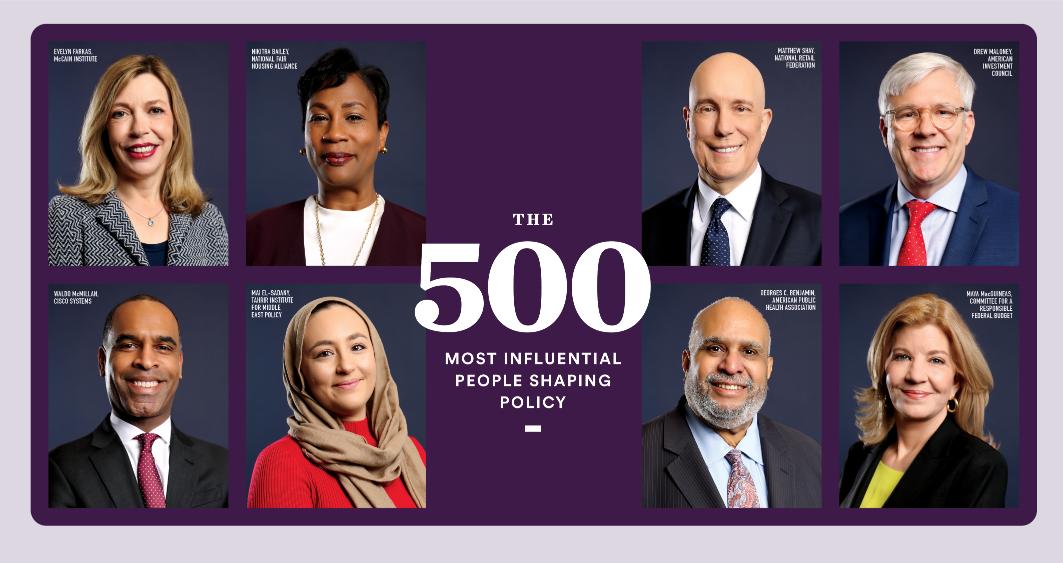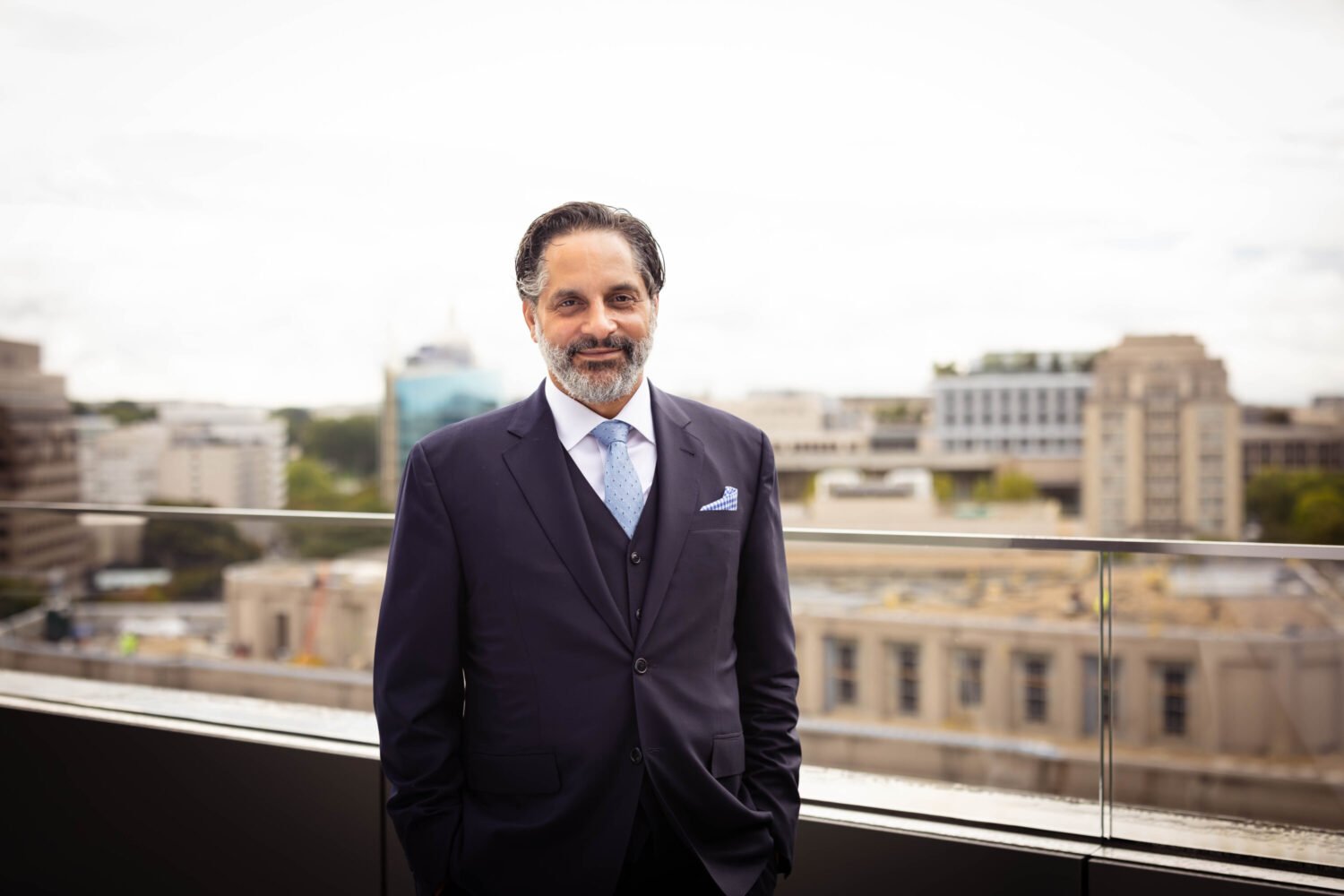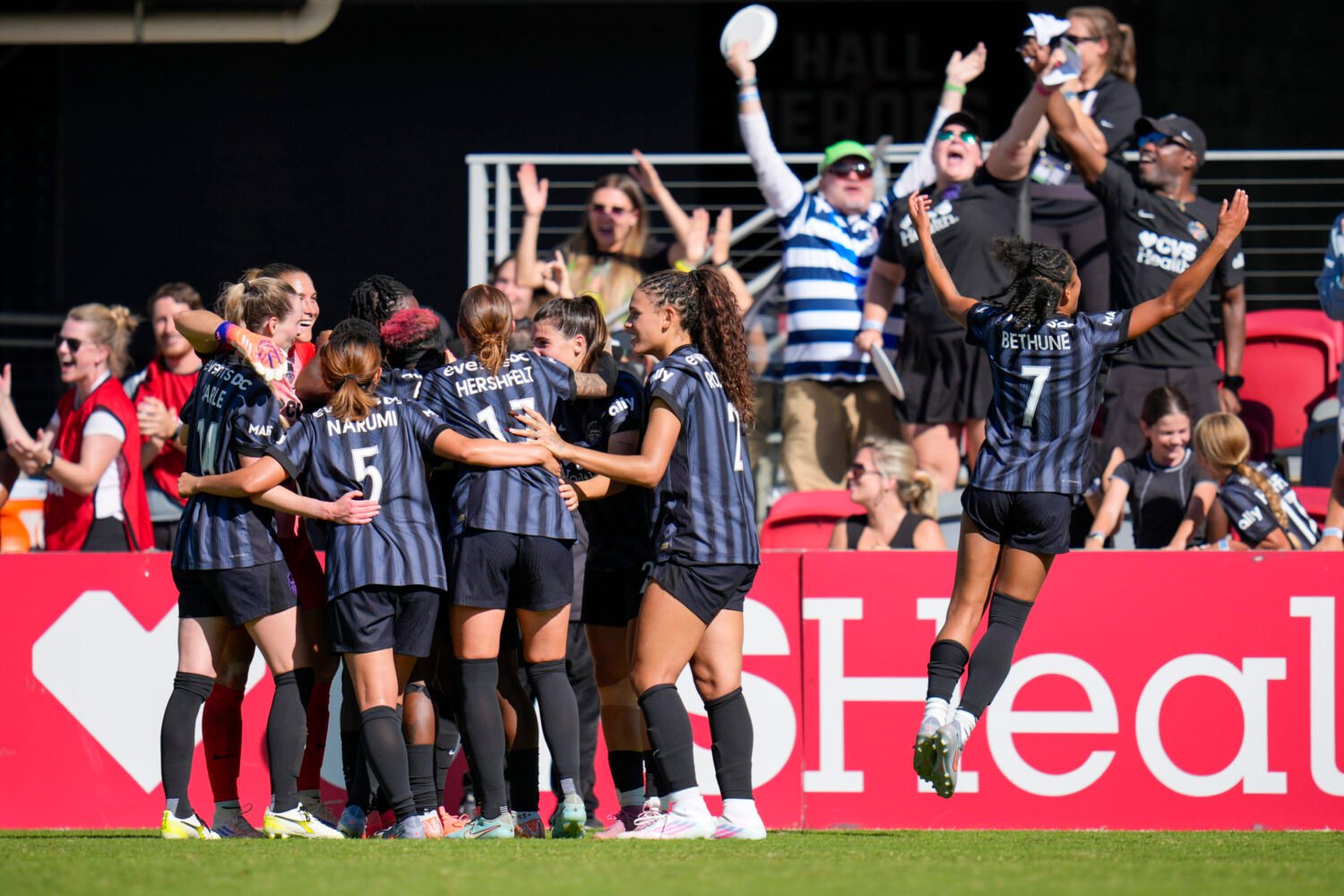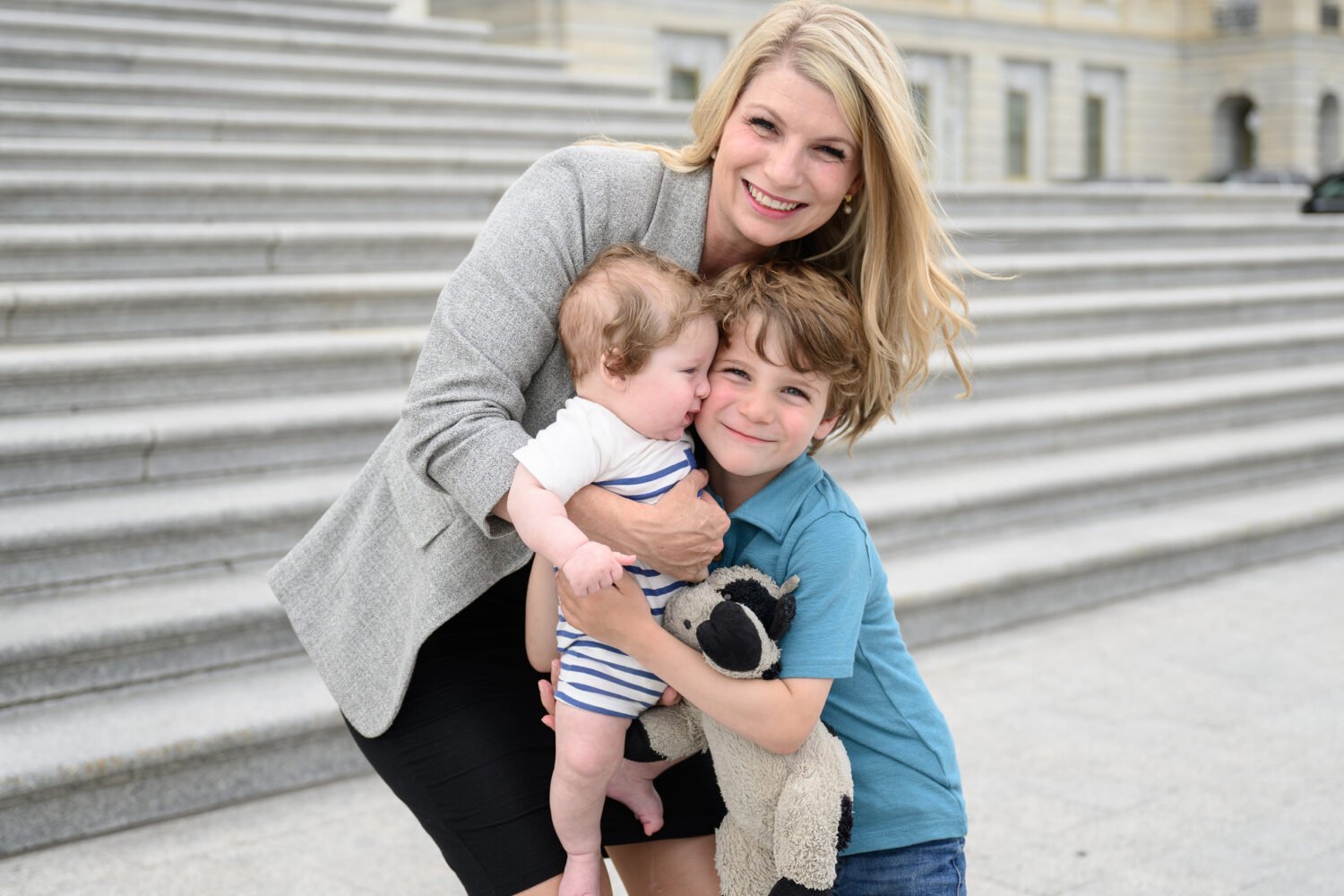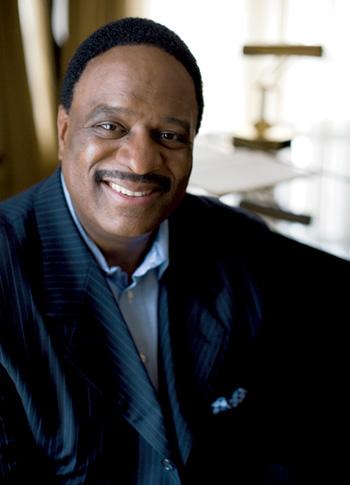
For a mountain of a man who goes toe to toe with high-test talking heads like former football stars Howie Long and Dan Marino, James Brown makes a surprising admission when we meet.
The setting is the Hunter’s Inn, a restaurant in Potomac. On a Monday evening, families are dining, businessmen are doing deals, two guys who’ve been fishing are telling tales at the bar. Brown—everyone calls him JB—is the only African-American in the place except for the waitstaff. It’s familiar territory for him. He works and travels in a largely white, first-class world, far from his roots in subsidized housing in a DC neighborhood now being bulldozed to make way for development near the new Washington Nationals ballpark.
Sitting down with us is Jeff Fried, JB’s friend and adviser. They order calamari salad. It arrives. JB closes his eyes, lowers his head, and prays. They dig in. We talk. Fried leaves to spend time with his family. I ask JB where he spent the afternoon.
He says, “I just came from the last grief-counseling session for my mother.”
Mary Ann Brown died in June 2006 after a battle with cancer. She was 72. The people who attended the funeral at her DC church “represented all the Benetton colors,” he says. “It was like a state funeral.”
His emotions are still raw.
“She poured herself into me,” he says. “She didn’t go to college, but she had a PhD in common sense. My dad worked two jobs. They never had their hand out, but they sent four of us to private school. I hope my life is a testament to her.”
JB has achieved his greatest public success so far as the host of two popular pro-football shows, The NFL Today on CBS and Inside the NFL on Showtime.
“Typically,” says Inside the NFL producer Peter Radovich, “this business has a lot of cattiness and jealousy, a lot of resentment between the personalities. JB is one exception to that rule.
“Athletes are blessed with talent,” he adds. “JB is blessed with likability.”
During the days I spend with JB, he talks about lessons learned from his mother, such as how she laid down the law over homework: “My brothers and sister had to be at the kitchen table doing homework when the streetlights came on.”
JB was a basketball star at DeMatha High, a powerhouse coached by the legendary Morgan Wootten. One evening, practice went past dark. Mary Ann Brown called school.
“Is James there?” she asked.
“He’s on the court,” a secretary said.
She asked to speak with Wootten.
“My son has to be home at 7 pm to do homework,” she said, according to JB and Wootten. “No homework, no basketball.”
“She meant it,” JB says.
Pretty soon I’m telling stories about my mother, who passed away in 2001. We’re both getting moist around the eyes when JB looks up and says, “At heart, I guess I’m just a mama’s boy.”
Mary Ann Brown would be proud of her eldest son at age 57. He doesn’t drink or smoke or curse. He works hard. Every week during football season, he takes the train to Philadelphia midweek to tape Inside the NFL and goes to New York every weekend to do live hosting on The NFL Today. In between, he runs Brown Technology Group, an information-technology firm he owns with Reggie Brown (no relation) and his brother Terence. He married well and raised a daughter, goes to church and Bible-study classes. He’s the patriarch of an extended family that includes siblings, nieces, and nephews—and a granddaughter.
Now, as they say in sports-speak, JB has a chance to take it to the next level.
He attained his greatest exposure as host of Fox NFL Sunday, pro football’s most popular pregame show, from 1994 to 2006. He won a Sports Emmy for best studio host. He left Fox for CBS with a contract that opened the door for him to do news.
Could he see himself anchoring the nightly news?
“Heavens, yes,” he says. “I hope I’ve shown I can be credible in commenting on issues other than sports.”
Jeff Fried, who helped negotiate news into the CBS contract, says JB is pitching stories to 60 Minutes.
“It’s a natural transition,” Fried says. “Two of the greatest attributes in the public eye are integrity and trustworthiness. JB has both.”
Using my best investigative techniques, I tried to pry open doors into any dark corners of JB’s life. I wound up trying to answer two questions: How did he get to be so sweet? And is it possible for him to become a black Walter Cronkite?
To answer the “sweet” question, I sought out Virginia “Mama” Washington in North Michigan Park, the DC neighborhood not far from Catholic University where JB grew up.
“I often wonder why I latched onto James out of all the kids in the neighborhood,” she says. “He had a way about him. He was mannerly and respectful even back then. He wasn’t swell-headed.”
Washington and her husband, Louis, moved to Faraday Place, Northeast, in 1958, the same year the Browns moved to a small brick duplex on the next street. Their backyards faced each other.
“It was an ordinary neighborhood,” she says. The shelves in her tidy sitting room are jammed with photos of children and grandchildren. “There were teachers and government workers mostly. It was very quiet. The kids growing up here respected their elders. Many became doctors and lawyers.”
And most played sports. “We liked to see our kids organized and not on the street,” she says.
She disappears and returns with a black-and-white photograph of a Catholic Youth Organization baseball team, circa 1964. JB is sitting in the front row, his long legs folded up to his chest.
What made JB such a sweet kid?
“His mom,” says Washington. “She instilled in all her children the basic morals. She was also a strong person. She was the backbone of that family.”
His father, John, was 20 when JB was born; his mom was 16. They lived first in subsidized housing at Third and K streets, Southeast, near the Navy Yard. John Brown saved enough money so the family could buy a house uptown on Farragut Place in North Michigan Park.
“Dad was all about working two and three jobs,” JB says. “He had to do that to provide for a family of five kids and allow my mom to stay at home. He showed his love by working.”
Virginia Washington’s son, Louis Jr., carpooled to DeMatha with JB. She watched his rise to stardom on the hard court. “That’s how he got recognized,” she says. “Coaches were after him even when he was an innocent little fella.”
Morgan Wootten, the basketball coach at DeMatha, saw something special in James Brown. “JB made varsity as a sophomore,” Wootten recalls. “I coached All-Americans who played JV until they were juniors or seniors.”
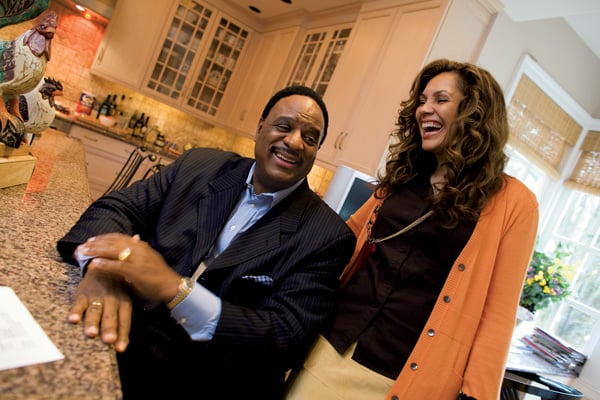
The kitchen in James and Dorothy Brown’s Bethesda home feeds an extended family that often includes any or all of his three brothers and his sister, his daughter and her family, Dorothy’s parents and sister, plus an assortment of visitors. JB calls it “controlled chaos.”
Why not James?
“He was an outstanding leaper,” says Wootten, now retired. “I cranked up the basket to 11 feet, and he still could dunk.”
JB would become a dominant center and first-team All-American. He was Washington Player of the Year in 1969 and helped DeMatha win three city championships, but Wootten remembers him for other reasons.
“From sophomore year on, JB was the most popular guy at DeMatha,” he says. “Everybody loved him. If he wasn’t on the court, fans would chant, ‘We want James!’
“I coached for 46 years, and I can’t recall another student who stood out as an athlete, scholar, and all-around good guy. He had a smile for everybody.”
One night during JB’s senior year, he took himself out of the game because he was exhausted. He collapsed almost in the coach’s lap, passed out, and was rushed to the hospital. The next game was against McKinley Tech for the city championship. Missing their star, the players draped his warm-up jacket on a chair and went on to win by 22 points.
Why did they like him so?
“It’s not all about him; it’s about everyone else,” says Wootten. “He would park his ego at the door and make everyone on the team better. He says strength is in the team, not the individual.”
JB says Morgan Wootten and Mary Ann Brown double-teamed him.
“The coach reinforced what I learned in my house,” he says. “God first, family second, school third—then basketball. That’s still my foundation.”
Wootten had one rule: “Coach said when we visited a college that wanted to recruit us, never say yes on the first visit,” JB recalls. “Always tell them you are 99 percent sure but need more time.”
JB remembers being smitten during his visit to Chapel Hill to meet North Carolina coach Dean Smith. JB was ready to shake on a scholarship when he remembered Wootten’s rule. He told Smith: “I’m 99 percent sure, but let me think about it overnight.”
Back in DC, JB found an invitation from Massachusetts senator Ted Kennedy to visit Capitol Hill and talk about Harvard. The senator sent a car for him. Kennedy lobbied for Harvard, but the hard sell came from alums Clifford Alexander and Barrett Linde.
JB recalls telling them he hoped to get a good education, play basketball, and turn pro. He was impressed that Alexander, a patrician African-American who would later run for DC mayor, and Linde, a Jewish developer, had stayed friends long after Harvard.
“As well as they are doing in the game of life,” JB says he thought at the time, “if basketball doesn’t work out, I’ll be prepared.”
He visited Harvard. He waited a day. Then he said yes.
Then another coaching deity, John Wooden of UCLA, called. “I have to talk to Coach Wooden,” JB told his mother.
“No way,” she said. “You committed to Harvard. You cannot go back on your word.”
After visiting with Mama Washington in DC, I head to JB’s home in Bethesda. The plan is to accompany him on the train to the taping of Inside the NFL in a New Jersey suburb of Philadelphia.
JB and his wife, Dorothy, bought the tan brick home off River Road in 1996. It has a half-moon drive and lots of ground behind it, but a 25,000-square-foot house going up across the street makes it look almost small.
JB greets me at the door: “Please excuse the controlled chaos.”
In the kitchen, granddaughter Kaela bounces on Dorothy’s lap. Kaela’s cousins are drawing on the floor. A pizza arrives—a late lunch for JB’s sister, Alicia. His brother John, a retired DC firefighter, lives upstairs. JB sets his luggage for the two-day trip by the door. His driver, Tony, arrives.
At 3:30, Elizabeth Malia, JB’s longtime assistant, summons him to his basement office for a radio interview. On the office walls are black-and-white photos of JB in DeMatha and Harvard uniforms, posters of two of his classic cars, and a desk so jammed with papers that he has to clear space for his lunch: steamed sea bass with sweet potatoes and asparagus.
At 3:45, we’re on our way to Union Station, weaving through early rush-hour traffic, talking about the Dallas Cowboys.
JB has a way of treating everyone like an old buddy—and many are.
Driving down his street, he asks Tony to stop so he can chat with two neighbors. At Union Station, he has time for fans and redcaps. Everyone seems to know JB, especially waiters and drivers and hotel staff. He remembers them, distributes shakes and hugs and tips, uses first names. It’s as if Aretha Franklin is crooning “R-E-S-P-E-C-T” in his ear.
JB rides first-class to Philadelphia on the Acela Express. At 5:30 he orders “small bites” from the evening menu: hummus, toasted chickpeas, celery and carrot sticks, radishes, and a cucumber slice. “I hurt my knee a few months back and couldn’t exercise, and have to be careful what I eat,” he says.
Food and exercise are always on the mind of a guy who can pack close to 275 pounds on his six-foot-five frame. He’s hired a few nutritionists, including one who took blood samples and suggested diets to keep weight off.
He eats a chickpea and smiles: “I’m smiling because the food that eventually worked best for me in cleansing my system was . . . watermelon. Howie Long and Terry Bradshaw and I were waiting to go on The Tonight Show when they started joking about JB and watermelon. When Jay Leno walked in, I suggested that they joke about it on the air, Leno said, ‘I’m not going near that one.’ ”
JB and Bradshaw bonded. Says JB: “Somehow the lovable redneck former quarterback from Shreveport, Louisiana, and the urban black hoops player with the Harvard diploma got very close. We had a special magic.”
JB talks about their first Fox NFL Sunday show in September 1994. They were arrayed along a table: JB, Bradshaw, Long, and Jimmy Johnson.
“Three minutes,” the producer said.
Bradshaw reached into his pocket and pulled out a tiny jar of lip moisturizer. “Hey, coach,” he said to Johnson, “put some of this on your lips.”
“Two minutes.”
Bradshaw looked down at Long: “Hey, big boy, you look uptight. Take a little of this and put it on your lips.”
“Minute-thirty.”
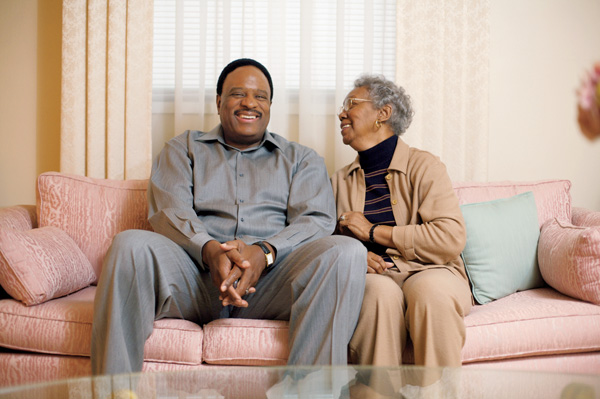
JB checks in often with Virginia “Mama” Washington, who still lives in the house that backed up to the one where he grew up in DC’s North Michigan Park, not far from Catholic University. “I never forget where I came from,” he says.
JB turned to Bradshaw. “Hey, Mr. Redneck, don’t you have some of that for your brother?”
Bradshaw reached into his pocket and leaned over to take a look at JB’s lips.
“I’m going to need a whole handful.”
The director said, “Three . . . two . . . one,” and raised his hand for the live camera.
“We came on laughing from day one,” JB says.
James Brown never aimed to be a TV star. A pro basketball star, yes. A doctor or lawyer, maybe.
At DeMatha, he got straight A’s and was elected class president. At Harvard, class of ’73, he majored in American government and was a C-plus student. His first year, Harvard had admitted about 300 African-American students, about a quarter of the freshman class.
“It was a wonderful, exciting time,” he says. “There were so many people of color. I met students from all over the world.”
Bill Bradley, playing for the Knicks, was his model. “He had graduated from Princeton and been a Rhodes scholar. I realized you could be both a scholar and a pro athlete.”
Going into his sophomore year, he was a preseason All-America pick. He made the all–Ivy League team three years and captained the team his senior year.
The Atlanta Hawks drafted Brown in the fourth round. Cotton Fitzsimmons was the coach; Pete Maravich was the star. “I saw myself playing ten years in the NBA, then becoming an entrepreneur or going to law school,” he says. “I would do well in the game of life.”
The Hawks cut JB a few months into his first year. It was his first failure. He went home to DC, looked in the mirror, curled up on his bed, and had tears coming down his cheeks. For two weeks.
“It was shocking, jolting,” he says.
We’re still on our way to Philly.
Did he seek help from his mother or Coach Wootten?
“I didn’t need anyone to tell me why,” he says. “I didn’t work hard enough. In high school, I was religious in doing drills. But when I got to college, I started resting on my laurels. I stopped working. And I didn’t pick it up until I was getting ready for training camp in Atlanta.”
It was, he says, a seminal moment.
“I realized there are plenty of people with talent in this world,” he says, “but that will only get you in the door if you are lucky. Then it’s all about work and practice and more work.
“I vowed that I would never let another moment like that pass me by for lack of being prepared. From that moment on, I have had a free-agent mentality. I played the game of life as if I could be cut at any time.”
We’re almost in Baltimore when JB’s BlackBerry goes off—again. It’s his nephew John S. Brown Jr., who puts his son, Quentin, on the phone.
“How’s school?” JB asks. “Are you still on the honor roll?” Quentin goes to elementary school in Largo. “If you are,” JB says, “Granddad and Uncle JB would like to be at the assembly.”
JB turns to me.
“Understanding the value of getting good grades is a struggle for a lot of young African-American boys,” he says. “I always try to reinforce the importance of doing well.”
Doing well at Harvard helped JB get jobs after his NBA dream went bust. He first worked for DC Health and Human Services under Joe Yeldell. After a year, he landed a sales job with Xerox. He had an Afro and thick sideburns. A manager took him aside and suggested he start looking and dressing for the job. He did—and began moving up the corporate ladder.
“I realized pretty early on that going to Harvard would open doors,” he says, “but the key was how would I capitalize when the door was opened?”
He left Xerox in 1979 to become a top salesman with Eastman Kodak. He expected to become a corporate executive.
Petey Greene invited JB to be a guest on his WDCA TV show, Petey Greene’s Washington, in 1979. Greene, a local legend who went from prison to fame on radio and TV, wanted JB to talk about making the adjustment from disappointment to success.
After the show, Greene took JB aside.
“I hear there’s an opening for a sports analyst with the Washington Bullets,” he said. “Go over and audition.”
“I don’t know the first thing about radio or TV,” JB replied.
“I don’t want to hear about it,” Greene said. “Just go over and try it out.”
JB checked in with Bob Ferry, then the team’s general manager, and set up the audition with WDCA. He felt at home behind the microphone, and he knew the game. He became the Bullets’ team analyst.
After a year, Marty Aronoff, a Bullets statistician and a producer at Channel 9, suggested that JB apply for a slot on the sports desk, doing vacation and weekend relief for Glenn Brenner and Frank Herzog.
“I thought he had terrific potential,” Aronoff recalls. “His personality would come through.”
Sonny Jurgensen had the job but didn’t always show up. Still working for Eastman Kodak, JB moonlighted for the CBS affiliate. He learned the basics of logging tape and hosting weekend public-affairs shows and reading teleprompters. He cohosted Fast Break, a high-school-basketball show with Morgan Wootten.
One Christmas Eve, Glenn Brenner was sick and Frank Herzog, his number two, was off. Aronoff told JB, “I think you are ready.”
JB had his doubts: Could he measure up to sharing the set with two stars, Gordon Peterson and Maureen Bunyan?
“I can do that,” he says he thought.
Aronoff had reduced the sports segment to a couple of games with highlights, and he told Brown how to synchronize his script with the video. Midway through his debut, the teleprompter malfunctioned. JB looked down to read the script, but the video highlights had ended and viewers saw the top of JB’s head. He looked up and said, “Hi there.”
JB kept talking past his allotted time. Aronoff motioned for him to stop, but JB didn’t understand. Even when the cameras backed away, he kept talking.
Finally realizing his goof, he smiled and apologized—on live TV.
Says Aronoff: “Everyone felt for the guy. Even the viewers were pulling for him.”
There would be more messy moments.
In Tampa, doing one of his first play-by-play telecasts for an NFL game, he was live on camera when one of the running backs broke into open field.
“He’s at the 45, the 50, the 60, down at the 65,” JB said.
“JB!” the producer screamed into his earphone. “There is no 60-yard line! Go to commercial.”
Despite the miscues, JB slowly became a solid member of the CBS sports-telecast team, doing college hoops and NFL games. When CBS fired Brent Musburger on April Fools’ Day 1990, two NCAA sportscasting seats were in play: studio host and play-by-play. The head of sports asked JB if he would be interested in one.
JB says he would have liked either.
“You would be the first black person to do lead play-by-play or host a major sport on network TV,” the executive told JB. “How would you handle it?”
“Same as I have handled everything else,” he said.
Jim Nantz got the play-by-play, and Pat O’Brien got the studio job.
“It hurt,” JB tells me. “The boss never came to me. It was like being cut by the Hawks.”
JB says he considered quitting and returning to the corporate world. A friend, Dan Jiggetts, told him that was not an option.
“Too many young black kids have come to depend on seeing you on the TV,” Jiggetts said. Like JB, Jiggetts had gone to Harvard. He had starred as a lineman and played for the Chicago Bears. He had gone into broadcasting and worked with JB at CBS. “You cannot quit,” he said.
JB’s sister, Alicia, suggested he start seeing a speech coach. He found one at Villanova University near Philadelphia. “She sharpened my diction and elocution,” he says.
His mother sharpened his prayers. “The Lord will make room for your talent,” she told him.
Three years later, Fox grabbed the rights to televise NFL games and hired JB to host its Sunday pregame telecast.
The train arrives in Philadelphia. A driver hired by CBS picks us up and drops us off at the Four Seasons, where JB spends Tuesday nights during football season.
In the lobby, an executive with Morgan Stanley stops to chat with JB. He has seen JB deliver the keynote address and prayer the week before at a dinner for the Executive Leadership Council, a national organization of African-American executives.
“Great event,” the young exec tells JB. “You were inspiring.”
After he leaves, JB wants to talk about race. He sits down in an armchair, crosses his feet—size-13 black Ferragamo slip-ons, silver buckles—and brings up the Washington Nationals.
“Remember when Marion Barry called the minority partners rent-a-blacks?” he asks. “That stung me.”
That was in 2006 during the selection of an owner for the Washington Nationals. Seven ownership groups were vying for the team. JB had joined the Lerner family as a minority partner. Barry and then–DC Council member Vincent Orange were supporting a competing group with a different set of minority partners.
“I joined with the Lerners to help bring baseball back to Washington,” JB says. “Baseball was my first love. I wanted it to come back to town and be showcased to the young kids who would grow up and play the game.
“Besides, the stadium was being built five blocks from where I was born.”
Brown says he agreed to become part of the ownership group with the understanding that he wouldn’t take part in the primary decisions of running the team.
“I knew that would be up to the Lerners,” he says. “My interest was to have African-Americans share in the economic pie and to spread some of the work in the stadium to black businesses in town. I think we accomplished that.”
Late in the negotiations, JB says, another prospective team owner approached him and asked him to become team president.
“That would have been using me for window dressing,” he says. He declined.
Has he been involved with the Lerner family’s contentious business relations with the city over stadium rent?
“No.”
Is he pleased with the number of contracts going to minority-owned firms?
“It’s happening,” he says, “but not to the degree we would like. I would like to see more marketing to the African-American community.”
As for Barry’s “rent-a-black” accusation, JB says the former mayor approached him after the Lerners were chosen as owners. He didn’t apologize, but he did say, “Nothing personal against you.”
Late morning Wednesday: JB is doing drills on the set of Inside the NFL. Showtime tapes the show at NFL Films, the archive of pro-football footage and memorabilia in Mount Laurel, New Jersey.
JB—in pinstripe suit, lavender shirt, and striped tie—is going through his drills: “Ring rang, sing sang, tung tang.” He’s puffing up his cheeks like Satchmo, grinning and squinting, the way an athlete stretches before a game.
Phil Simms is walking around cracking wise with Cris Collinsworth. Bill Cowher takes his seat on the set. For the next four hours, they’ll tape and retape and tape again segments and discussions that editors will mix into an hourlong show to air at various times Wednesday through Saturday.
Being with Showtime and CBS is a homecoming of sorts for JB, but it’s not how he saw his future back in 2004. He was in the tenth year of hosting Fox NFL Sunday. It was the premier football talk show; he and Bradshaw, Long, and Johnson had a chemistry that drew fans. “Controlled chaos,” JB describes the show. It had won four Sports Emmys; JB had won two more for hosting.
When his contract came up in 2004, JB says, the attorney for Fox played hardball on money and other matters.
“What turned me off was more the attitude,” JB says. “His belief was I was just a role player and the show would be fine if I was not there.”
The talks proceeded through the 2005 season without resolution. As Christmas approached, there was no deal.
“Their attorney figured I had no place to go,” JB says. “The seats for hosting NFL shows were taken: CBS had Greg Gumbel, NBC had Bob Costas, ESPN had Chris Berman.”
JB called Mary Ann Brown, who was beginning her battle with cancer.
“We prayed on it,” says JB. “I’m a firm believer, thanks to my mom, that the good Lord would make a place for my gifts to show.”
JB’s spiritual awakening came when he was a young man.
JB doesn’t recall religion being part of his life when as a boy in Southeast DC. When the Browns moved to Michigan Park in Northeast, he and the family practiced Catholicism. Kids played sports in CYO, the Catholic Youth Organization. DeMatha High was a Catholic school.
Religion became less important when he left DC for Cambridge. “After college,” he says, “I became a nondenominational Christian.”
His mother and sister, Alicia, began to practice “word-based” Christianity, rooted in a literal translation of the Bible. That came at the time JB was working for Xerox.
“I was making a good salary and driving around in a Corvette,” he tells me, “but it seemed I was involved in superficial pursuits. It seemed like an empty life to me.”
He joined his mother as she tried to find a spiritual home, first to the Isle of Patmos Baptist Church, then to the Miracle Faith Center.
“I was hungry to learn,” he says.
In 1975, at age 24, James Brown made his commitment to Jesus Christ and became born again.
“I consider my strong belief in God pivotal to my success in life,” he says.
The Browns found a home with Rhema Christian Center Church, a church in the Michigan Park neighborhood. Five years ago, JB was ordained as a minister; he occasionally speaks at church or Christian events. In May, he received an honorary doctorate and delivered the commencement address at Carver Bible College in Atlanta.
JB tried to pray with his mom before every game, every appearance, every show, beginning when he first did analysis for the Washington Bullets. “We would pray that my words would be accurate, that I would be an effective coworker, that I would do everything excellently unto the Lord.
“People can think what they want,” he says. “Prayer works in my life. It’s real.”
Early in 2005, with JB’s contract talks at an impasse, there was a shift at CBS. Greg Gumbel moved from hosting The NFL Today to doing play-by-play. When the seat opened up, CBS approached JB.
“No hardball,” he says. He and CBS quickly agreed on a deal that would allow Brown to expand from sports to news. There was little haggling over money.
When Fox executive David Hill realized he might lose him, JB says, he tried to lure him back with a promise to create a news program that he would host.
“They put on the full-court press,” JB says. “I had already shaken hands with CBS.”
It’s after 1 pm, and the “talent” is taking a lunch break. JB sits across from Simms and Cowher eating more sea bass and sweet potatoes.
I stop Cris Collinsworth between bites and ask his impression of JB’s move from Fox to CBS.
“I can’t believe they let him walk,” he says. “What a huge mistake.”
Collinsworth was a Pro Bowl receiver for the Cincinnati Bengals in the 1980s. He went on to get a law degree. He’s been on shows with JB at Fox and now at Showtime.
“JB and Terry Bradshaw were a perfect combination,” he says. “There was a magic to their relationship—the friendly redneck and the Harvard-educated urban guy. They truly loved one another.”
And ribbed one another incessantly. Collinsworth tells this one:
Struggling with his weight one season, JB hired a personal trainer. For three weeks, the trainer accompanied him to the Fox set. He monitored every meal, often egg whites, salad, and fruit. The fourth week, JB arrived on the set alone.
“Hey, JB,” Bradshaw said, “where’s your trainer?
Howie Long broke the silence: “I think JB ate him.”
Can James Brown win a seat at the table of news anchors? I put the question to him during our ride back to Washington Wednesday evening.
“As soon as the football season is over, I intend to start pitching story ideas to 60 Minutes,” he says. “I am already guest-hosting on CBS’s Saturday Early Show.”
JB says he has honed his news and reporting skills doing tough TV pieces for HBO’s Real Sports show, considered the 60 Minutes of sports. He’s done hard-hitting stories on sports figures such as Rasheed Wallace and Major League Baseball commissioner Bud Selig. He has also hosted the syndicated talk show America’s Black Forum.
“I think I’m pretty credible and conversant in issues other than sports,” he says.
How far can he go in news?
“That’s not defined yet,” says CBS news and sports president Sean McManus, “but it’s clear JB has tremendous talent in interviewing. He’s without doubt the best studio host in America when it comes to sports.”
Could he become a news anchor in the mold of Walter Cronkite?
“The issue is not JB’s talent and credibility,” says McManus. “But there is still a big difference between making your career in news or in sports. Having a journalistic background is part of the criteria.”
One CBS producer believes JB is already there. “He has the sensibility of a reporter,” says Pete Radovich. “He asks questions we don’t think about. JB thinks like a journalist. We need someone to keep the players and coaches honest.”
JB says he was not ready to see his mother pass away.
“She showed me more about how to live in how she handled her dying,” he tells me. “She never complained. She never wavered in her faith. She never stopped tithing.”
Though Mary Ann Brown will never be replaced, JB has a bond to his mom through Virginia Washington that fills a place in both of their hearts.
“Some kids go to college and forget about their old neighborhoods,” Mrs. Washington tells me one day. “James often comes to visit folks, and he always stays in touch with me.”
One winter, JB was in California on detail for Xerox when he read about a blizzard that had hit DC. She says he called.
“Mrs. Washington,” he said, “I was thinking about you. Are you doing okay? Do you have food in the house?”
When Mrs. Washington was fighting cancer, JB stayed in frequent contact. When she recovered, he bought her a cell phone and put her on his monthly account. When she visited her grandson at St. John’s University in New York in 2006, JB arranged transportation and lodging for her and her granddaughter, Krystn.
“He’s really been there for me,” she says. “I am seeing more of him since his mother passed away. He tells me he prays for me every night.
“That’s what his Mom instilled in him, and he has never forgotten, never changed.”
This article first appeared in the December 2008 issue of The Washingtonian. For more articles from that issue, click here.




